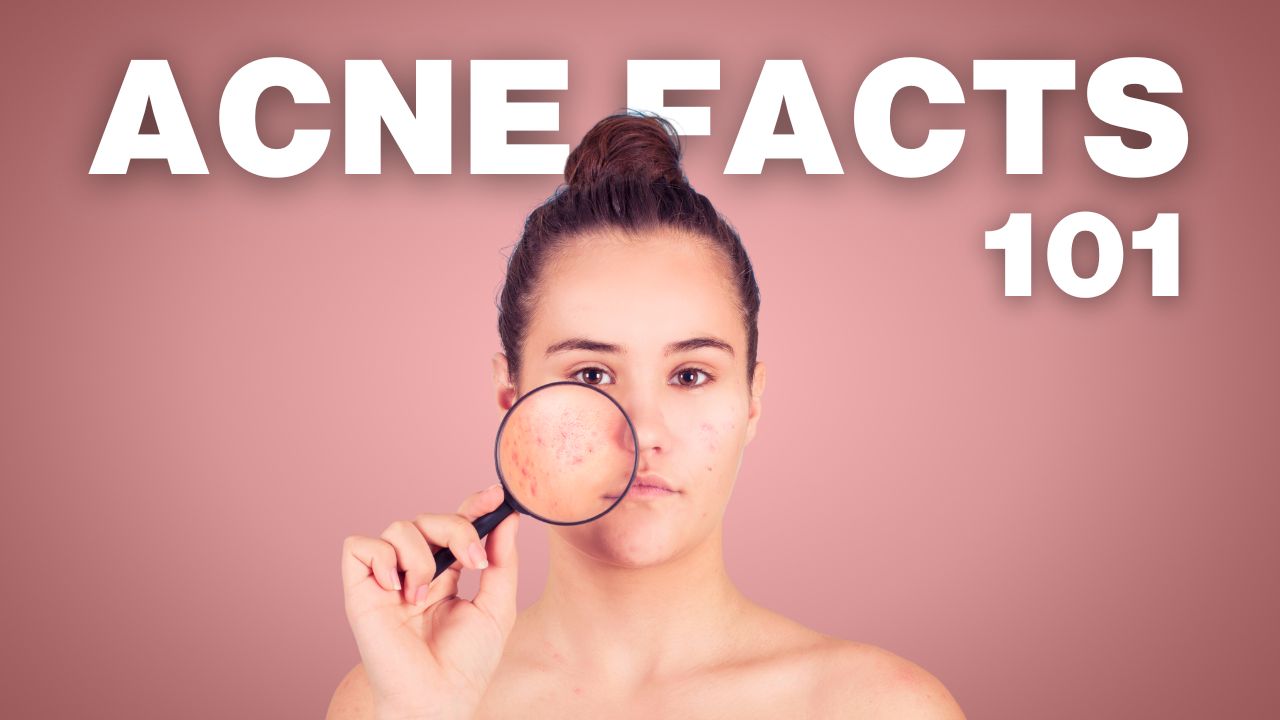Acne Facts 101

Table of Contents:
- Introduction
- What’s Acne Anyway?
- Why Do We Get Acne?
- Types of Acne
- Acne Myths Busted
- How to Treat Acne
- Preventing Acne
- When to See a Dermatologist
- Conclusion
Introduction
Hello, beautiful! Let’s chat about acne today. The bane of our existence. That which we all love to hate. Those pesky bumps that show up just when you don't want them. Tp be honest, acne is not just for teens. It has been known to mess with adults too, and how! So let's break down what acne is, why it happens, and how to deal with it in this quick read blog.
What’s Acne Anyway?
Acne happens when your hair follicles get clogged with oil and dead skin cells. This causes whiteheads, blackheads, and pimples. It usually pops up on your face, forehead, chest, back, and shoulders. Why? Because these areas have a lot of oil glands.
Why Do We Get Acne?
Here are some reasons:
- Too Much Oil: Your skin makes too much oil (sebum), which can clog pores.
- Dead Skin: Dead skin cells can block your hair follicles.
- Bacteria: A bacteria called ‘Propionibacterium acnes’ can grow in clogged pores and cause inflammation.
- Hormones: Hormones called androgens ramp up during puberty, causing more oil production. Hormonal changes from pregnancy or birth control can also affect acne.
- Diet: Some studies say carbs like bread and chips might make acne worse. Chocolate and dairy could also be culprits.
- Stress: Stress doesn't cause acne, but it can make it worse.
- Gut Issues: A weak or compromised digestive health can trigger acne.
Types of Acne
There are different kinds of acne:
- Whiteheads: Closed clogged pores.
- Blackheads: Open clogged pores.
- Papules: Small red bumps.
- Pustules: Red bumps with pus.
- Nodules: Big, painful lumps under the skin.
- Cysts: Painful, pus-filled lumps deep in the skin.
Acne Myths Busted
Let’s clear up some myths:
- Myth 1: Acne is from being dirty: Nope. Acne isn’t about dirt. Over-scrubbing can actually make it worse.
- Myth 2: Only teens get acne: Wrong. Adults can get it too.
- Myth 3: Popping pimples helps: Don't do it! It can cause scars and infections.
How to Treat Acne
Here’s what you can do:
1. Over-the-Counter: Products with benzoyl peroxide, salicylic acid, or alpha hydroxy acids can help.
2. Prescription Meds: If OTC stuff doesn’t work, a doctor can prescribe stronger meds like antibiotics, retinoids, or birth control pills.
3. Therapies: Light therapy, chemical peels, and extractions can be effective.
4. Home Remedies: Some people use tea tree oil, green tea extract, or aloe vera.
5. Natural Skincare: Pore-shrinking toners, gentle exfoliants, revival serums when taken from a reputed brand can help tremendously in managing acne.
Preventing Acne
You might not stop acne completely, but you can reduce it:
- Good Skincare: Wash your face gently twice a day and after sweating. Use products that don’t clog pores.
- Hands Off: Don’t touch your face too much.
- Smart Choices: Use makeup and skincare labeled "oil-free" or “non-comedogenic."
- Shower After Exercise: Sweat can contribute to acne, so shower after workouts.
- Eat Healthy: Eating a balanced diet and staying hydrated can help.
When to See a Dermatologist
If your acne is really bad or bothering you a lot, see a dermatologist. They can offer treatments stronger than what you can buy over the counter.
Conclusion
Acne is annoying, but understanding it helps. Whether you’re dealing with a few pimples or more severe acne, there are ways to manage it. If OTC options don’t work out, get professional help. Clear skin is possible. It is closer than you imagine. Go for it!